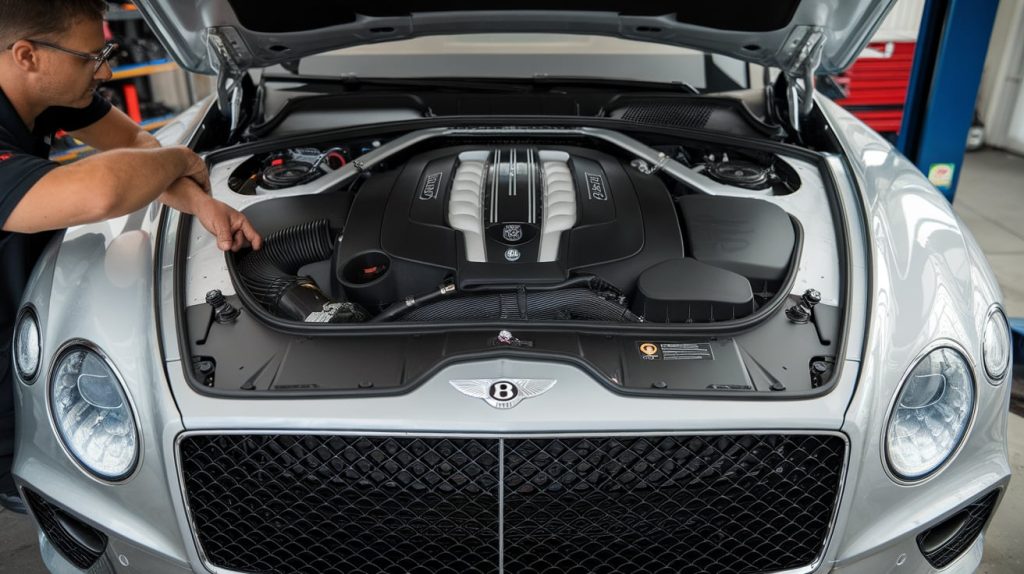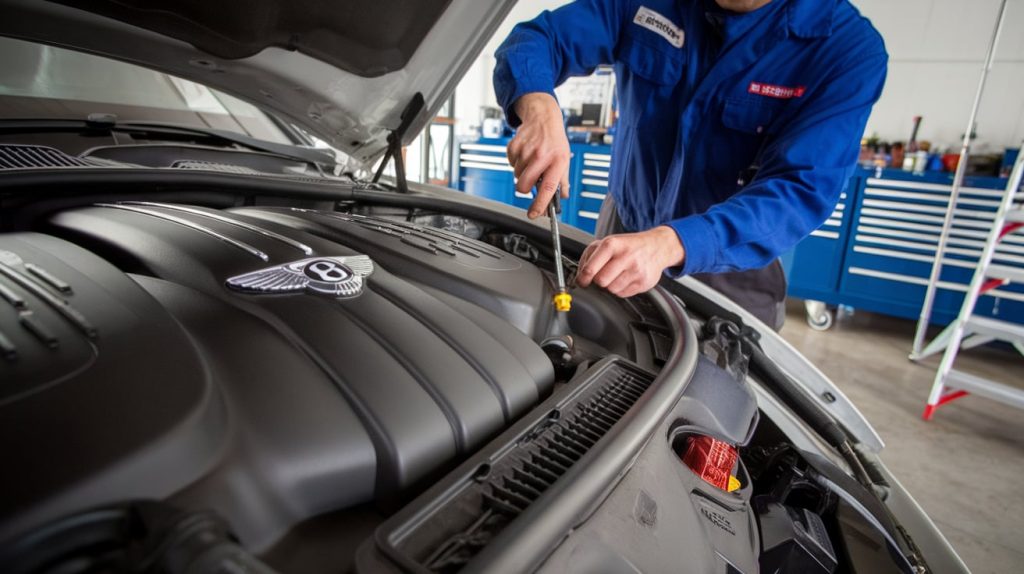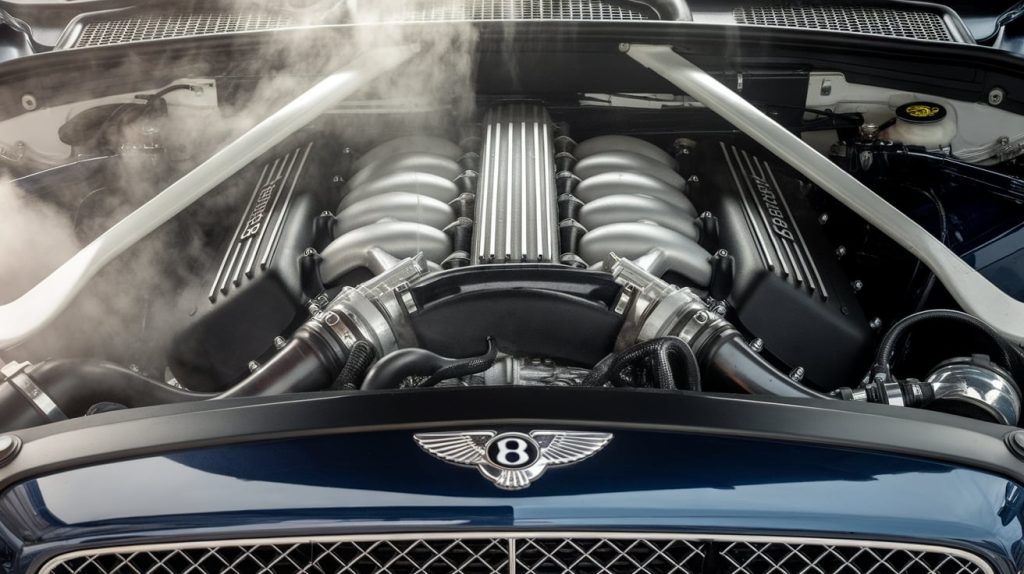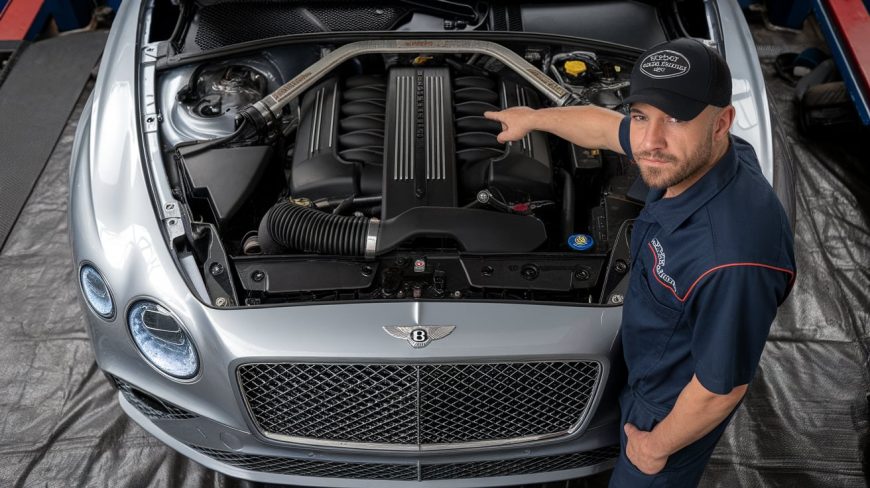What if your Bentley engine suddenly overheats in the middle of Sheikh Zayed Road, no warning, no mercy, just a rising needle and panic? In Dubai’s heat, that is not just a bad day. That is a ticking time bomb under your hood. Whether you drive a Bentayga or a Continental GT, engine overheating in the UAE is more common than most owners expect. And no, topping up coolant once a year does not cut it. Why this keeps happening and how to stop it before it ruins your Bentley.
What Does Bentley Engine Overheating Actually Mean?
What really happens when your Bentley engine overheats? It is not just about hot air under the hood; it is about critical parts inside the engine losing control. In Dubai’s traffic & heat, things can spiral fast. One minute your Bentley feels smooth; the next, it is gasping for thermal relief. Here is what overheating actually means:
- Heat Crosses the Safe Limit
When the engine temperature goes over 240°F, fluids break down and internal metal parts begin to swell, a silent killer for performance engines. - Coolant Fails to Circulate
If coolant is low, old, or blocked, it cannot pull heat away from the engine. The result? A slow buildup of heat that turns dangerous. - Cooling Parts Struggle
A tired water pump, sticky thermostat, or clogged radiator will lose its ability to regulate temperature. That is when the system falls behind. - Airlocks Disrupt Flow
Air bubbles trapped after a coolant top-up? They can block circulation completely, leading to localized boiling inside the engine.
So when your Bentley temperature warning flashes, or that gauge climbs just a little too far, do not wait. It is not overreacting. It is protection. One overlooked overheat can cost you an entire rebuild.
Top 6 Reasons for Bentley Engine Overheating in the UAE
In the UAE, the engine in your Bentley works harder than it was ever meant to. From desert roads to city gridlocks, it faces heat, stress, and long hours of AC load. When the Bentley engine overheats, it is usually not random; something inside the cooling system has failed to keep up. Here are 6 key reasons behind Bentley overheating issues in Dubai:
- Coolant Is Low or Leaking
If coolant levels drop, your engine has nothing left to fight heat. Leaks often come from cracked hoses, worn connectors, or radiator joints. In Dubai’s heat, even a slow leak becomes dangerous quickly. - Blocked Radiator
Sand, dust, or even dried coolant can clog the Bentley radiator. That stops heat from escaping. Once airflow is blocked, especially at slow speeds, engine temps start to climb with no relief. - Thermostat Not Opening
A stuck thermostat traps coolant inside the engine. That means heat builds up and stays there. Most Bentley thermostat issues show up during short drives or when you’re stuck in traffic. - Water Pump Not Circulating
The Bentley water pump keeps coolant flowing. When it weakens or fails, the coolant just sits in the engine. With no movement, the heat has nowhere to go , leading to fast overheating. - Cooling Fan Not Turning On
This fan is key in Dubai traffic. If the Bentley cooling fan fails, especially while idling or at stoplights, the engine gets no help cooling down. Without that airflow, overheating kicks in fast. - Trapped Air in the Cooling System
After a coolant refill, air bubbles can block proper flow. These air pockets stop coolant from reaching hot spots. If your Bentley was recently serviced and starts running hot, air might still be trapped inside.
Every one of these problems can lead to Bentley engine overheating, often with little warning. And in a place like Dubai, the damage can happen in minutes, not hours.

Why Bentley Engines Overheat Faster in Dubai
Dubai’s roads look smooth, but they are tough on engines. The constant heat and city driving quietly wear down your Bentley cooling system, pushing it past its limits without warning.
- High Temperatures Year-Round
The engine is always fighting outside heat, even during short drives. That leaves little margin for cooling. - Heavy AC Load
The air conditioning runs full blast most of the year, adding stress to the engine and reducing cooling efficiency. - Slow Traffic & Long Idling
City traffic reduces airflow through the radiator, making it harder to cool the engine when it needs it most. - Dust Blocking Airflow
Sand and debris block radiator fins, clog sensors, and prevent proper cooling over time.
Even luxury engines struggle in Dubai’s climate if not maintained right. Prevention matters more here than in most places.
Warning Signs Before Bentley Engine Overheating Gets Serious
Overheating does not always begin with steam or flashing lights. Your Bentley engine often gives off small signs before things go wrong. Spotting them early, especially on UAE roads, can save your engine.
- Heater Blowing Cold Air
If your heater suddenly pushes out cold air, it may mean coolant is not circulating properly. - Visible Coolant Under the Car
Puddles near the front wheels or under the engine often mean a leak in the coolant reservoir or hoses. - Tapping or Knocking Noises
Strange sounds from the engine bay might point to thermal stress or fluid flow problems starting up. - Engine Bay Feels Extra Hot
If you notice unusual heat when lifting the hood, even after a short drive, the cooling system might not be regulating temperature well.
These signals often go unnoticed. But in Dubai’s heat, even a small delay in action can lead to a full Bentley engine overheating situation.
What to Do When You See a Temperature Warning in Your Bentley
When that temperature warning appears on your Bentley’s dashboard, do not wait to see what happens next. In Dubai’s heat, every extra minute can cause internal damage that costs thousands to fix. Here’s what you should do, step by step:
- Slow Down & Turn Off the AC
Easing off the throttle and shutting the air conditioning reduces the load on the engine cooling system, giving it a chance to stabilize. - Pull Over Safely
Stop as soon as you can do so safely. Keep the engine running for a minute to allow the cooling fan to keep working, unless the warning light begins flashing. - Switch Off the Engine
If the needle stays high or the warning stays on, turn off the engine immediately. This helps prevent internal parts from overheating further. - Do Not Open the Radiator Cap
Wait at least 30 minutes before checking coolant levels. Opening the cap too soon can release hot steam under pressure, a serious burn risk. - Call a Bentley Specialist in Dubai
Once safe, contact a trusted Bentley repair garage. Tell them your model and what happened. They’ll know how to handle a coolant system emergency the right way.
Panicking does not help, but ignoring the warning can destroy the engine. The faster you react, the more likely you’ll avoid lasting damage from Bentley engine overheating.

What Happens If You Keep Driving a Bentley While It Overheats
Driving through a Bentley engine overheating warning is not just risky, it is expensive. Some owners think they can make it a few more miles, but in Dubai’s heat, that decision can destroy the engine before they even reach the next exit. Here is what really happens inside the engine if you keep going:
- Cylinder Head Gets Damaged
Heat causes the cylinder head to bend or crack. This leads to poor engine performance, leaking fluids, and internal pressure loss. - Head Gasket Fails
The gasket that separates oil and coolant breaks under high heat. Once this happens, fluids mix and the engine begins to overheat even more. - Engine Block Cracks
As the metal expands under pressure, the engine block can develop cracks. That is a major failure and often requires full replacement. - Pistons Lock or Seize
Without proper cooling, pistons and rods inside the engine swell and stop moving. This usually results in complete engine shutdown. - Transmission Damage
In some Bentley models, the cooling system supports both the engine and transmission. Overheating can reduce gear performance or trigger Bentley transmission problems.
By the time you notice smoke or feel a loss of power, most of the damage has already happened. One ignored warning in Dubai traffic can turn into a full Bentley engine rebuild.
How We Diagnose Bentley Engine Overheating in Dubai
In Dubai, diagnosing Bentley engine overheating is more than just checking the coolant. The heat, stop-start traffic, and long AC usage create unique pressure on the entire Bentley cooling system. That is why we use a clear, step-by-step approach. Here is how we identify what is really causing the overheating:
- Cooling System Pressure Test
We test your Bentley’s system under pressure to find hidden leaks in hoses, coolant tanks, or radiator connections. Even a slow drip can trigger a temperature rise in Dubai heat. - Radiator Flow & Fan Response
Using thermal tools, we check how well the Bentley radiator passes heat and whether the cooling fan activates on time. A slow fan or blocked fins can silently cause engine heat to build up. - Thermostat & Water Pump Check
We confirm the thermostat is opening at the right temperature and that the water pump is pushing coolant through all channels. A weak pump often leads to engine hotspots, especially at high speeds. - Air Removal & Bleeding
After any coolant work, we bleed trapped air from the system. Air pockets block flow and create localized overheating, which is common after poor service. - ECU & Sensor Scan
Using Bentley-specific diagnostics, we scan for overheating fault codes, fan delays, sensor mismatches, or past high-temp warnings logged in the system.
This diagnostic process at Bentley Repair Dubai gives us a full picture, from coolant movement to electrical faults. In Dubai, this kind of detailed check is essential to fix Bentley overheating problems the right way, the first time.

Bentley Models That Overheat More Frequently in the UAE
Not all Bentleys handle Dubai’s heat the same way. Some models are more prone to engine overheating because of their size, design, or how they are driven. Over the years, we’ve seen a pattern: certain Bentley models end up in our garage more often for cooling system problems. Here are the ones that tend to overheat more frequently:
- Bentley Continental GT
Its tightly packed engine bay holds a lot of heat. In traffic or high-speed runs, the coolant system sometimes struggles to keep up, especially in older V8 versions. - Bentley Bentayga
This SUV is heavy and built for power, but with long drives and full AC load, the cooling fan and radiator often face extra stress. It’s a common case in summer months. - Bentley Flying Spur
Known for its luxury ride, but the engine bay ventilation is more limited. Short city trips with repeated stops often lead to overheating warnings if coolant levels are not perfect. Regular Bentley minor service in Dubai helps prevent these issues by keeping fluids, sensors, and filters in check. - Bentley Mulsanne
The large V8 engine runs hot by design. In UAE weather, if the water pump or thermostat is even slightly weak, overheating kicks in fast, especially during slow drives.
Every Bentley is engineered for performance, but Dubai’s climate pushes these engines beyond normal limits. Knowing which models are more at risk helps you stay ahead of Bentley engine overheating before it turns serious.
In Dubai’s unforgiving heat, Bentley engine overheating is not a rare problem; it’s a silent threat that creeps up fast. Whether it’s a small coolant leak, a weak fan, or trapped air in the system, even the smallest fault can spiral into full engine failure if ignored. And once the damage is done, the repair bill is anything but small. Prevention is not just smart; it’s necessary.
If your Bentley has shown even one early sign, rising temperature, coolant loss, or an odd smell after driving, do not wait. Book a full cooling system check with our Bentley specialists in Dubai. We use original parts, advanced diagnostics, and deep experience with Bentley cooling systems to catch problems early. Protect your engine, protect your investment. Schedule your Bentley overheating inspection today, before it becomes a rebuild.






Leave a Comment